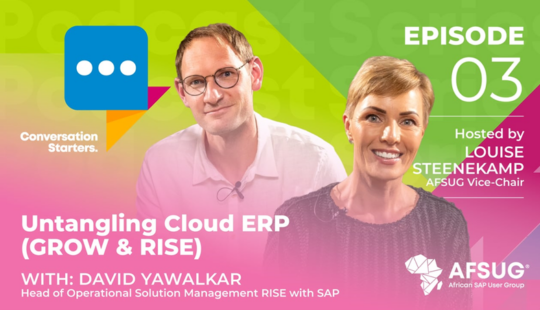Artificial intelligence (AI) technology, and generative AI, is increasingly relevant for businesses and should be an integral part of growth strategies. However, it’s important to consider the role of people and to navigate a market dominated by convergence, data democratisation, and the need for standardisation.
This is according to SAP executives who spoke on the first day of the biennial African SAP User Group (AFSUG) Saphila 2023 conference in Sun City yesterday.
It’s the first in-person and virtual Saphila event jointly hosted by AFSUG and SAP since 2019.
Kholiwe Makhohliso, recently appointed MD of SAP Southern Africa, said in the quest to help partners transform customers’ businesses and guide digital transformation journeys, it is important to recognise that a lack of in-house skills represents a challenge – particularly when it comes to AI.
This is where SAP and its partners are looking to exert their influence during a time of industry convergence, where core businesses, such as banking and telecommunications, are merging through technology.
Sven Denecken, senior VP, chief marketing and solutions officer for industries and CX, SAP SE Germany, said industry convergence is real and represents an opportunity as well as an obligation.
“You still need to innovate at the vertical edge of the industry,” said Denecken. “How ready are the customers? How ready are the partners to learn?’ In South Africa, and on the continent, many companies can leapfrog (but) they must learn from global best practices.”
Denecken believes SAP has evolved as a business through the COVID-19 pandemic to enable companies leverage technologies and run better. It also means that businesses are empowered with a realistic view of their technology posture and how this technology can be used.
“It is important to analyse where the customers are today and pick them up from that point. Don’t only show the future and the roads it will take to get there. Talk about the current challenges. For example, the degree of standardisation that a business leader allows, because that fuels innovation speed and the adoption of new technology, like AI.”
Denecken said AI tools can analyse billions upon billions of data and do so quickly, but it’s important for business leaders to understand what they want analysed and they need to be certain about what they would like changed.
Broader ecosystem
Keynote speaker, entrepreneur, and venture capitalist Vusi Thembekwayo said AI, as is the case with big data analytics, cloud, and machine learning, is part of a broader ecosystem and at the heart of this is data management and the urgency to acquire buy-in from all stakeholders.
“Business executives are trained to look for the data to make informed decisions and that’s cool, in fact, it’s fundamental. But when you want to lead people or an organisation into a place that you are uncertain of, finding the data to make those decisions becomes difficult.
“It’s about leveraging the ability to build a true system of connected intelligence. Data is the glue that holds it together. The team doesn’t self-cannibalise when things go wrong if it has something to pull them together… something beyond simply looking for the next kind of vantage point or the next market or the next set of customers or the next spot to grow exponentially.”
Thembekwayo said start-up companies, especially those that are technology focused, are reaching a stage of self-awareness and maturity – ego and self-interest is taking a back seat in favour of a maturity curve that is more focused on the collective rather than individual interest
This article first appeared on ITWeb.



